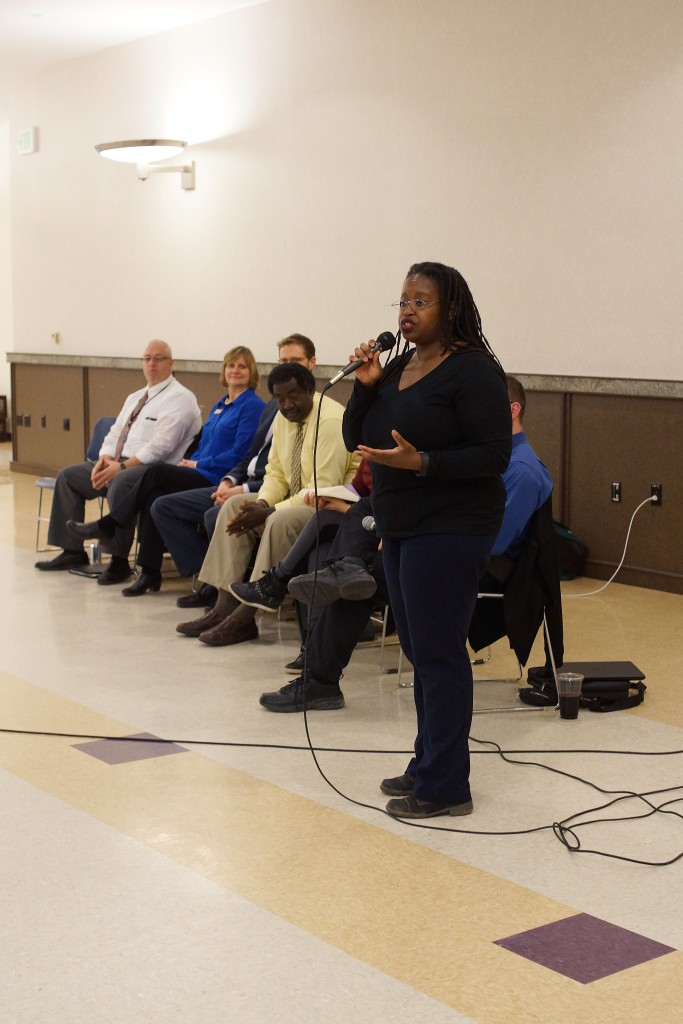
Interpersonal violence is frequently discussed on college campuses, but in the case of an actual incident, what to do can be unclear. Students gathered in Old Union Hall on Tuesday night to learn about the resources that Binghamton University offers for victims.
A panel of representatives from campus resources talked about the different services available. Panel participants included University Ombudsman Bathabile Mthombeni and members from the University Police Department (UPD), University Counseling Center (UCC), Residential Life, Office of Student Conduct, Title IX and the Dean of Students Office.
Mthombeni moderated the panel, and began by explaining that her role as Ombudsman is to listen to student’s concerns and connect them with resources on campus. Unless she perceives that there is an imminent threat, she said conversations remain completely confidential. She assured that her goal, which is shared by all campus resources, is to make sure students are safe.
“We are striving for a campus and community in which everybody practices consent — all the time, every time,” Mthombeni said. “Unfortunately, there are some pretty terrible things that can happen, and we want to make sure that people understand what they can do next, so that they can make the best use of the support that’s available on campus.”
Interpersonal violence occurs when someone uses power or control over someone else through physical, sexual or emotional actions or threats. This can include different forms of assault and rape, and can occur between people regardless of whether they are in a relationship.
UPD officer Matthew Rossie explained that the best thing to do in order to gather evidence of interpersonal violence is to go directly to UPD for an examination.
“From a police point of view, you are the crime scene,” Rossie said. “Don’t alter yourselves, don’t shower or change clothes. Notify someone right away and get medical attention and they’ll collect evidence and you should protect yourself and that evidence.”
Andrew Baker, the Title IX coordinator, explained that his office aims to protect students from sex-based discrimination. Doris Cheung, a case manager in the Dean of Students Office, said that once students come to talk to her, she represents them to professors and connects them with the Counseling Center.
“You can talk to me about any situation and we can brainstorm ideas,” Cheung said. “If you want to make an appointment with the Counseling Center, I will definitely make the appointment with you, so that when you walk out the door you have a plan, because you have to be brave to seek out help and we have to catch the moment and get things done.”
Nicholas Romero, a Dickinson Community resident assistant (RA) and a senior majoring in biomedical engineering, helped organize the event. He said this event was important because the topic is relevant to college students, but frequently gets ignored.
“We think it’s a very not-well talked-about topic on campus,” Romero said. “We learn about it in RA training, but we feel like residents and students on campus don’t get enough of this information. We want there to be resources, because there needs to be an increase in activity done on this subject.”
Nusrat Hossain, a sophomore majoring in integrative neuroscience, said she felt that the University needs to be more clear with students about available resources.
“They hand so many pins saying consent is mandatory in the beginning of the year, but not many people know what goes behind that or what goes into it,” Hossain said. “It’s really important to be familiar with campus services and I didn’t know who any of these people were before I came and they’re important resources.”
The second part of the event will deal with rights that students have if they are accused of interpersonal violence or are a witness of it. The talk will take place in Old Union Hall on Tuesday, March 22 at 6 p.m.


